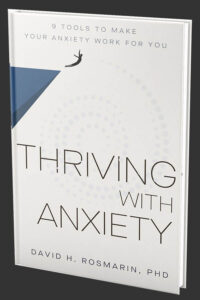Thriving With Anxiety With Dr. David Rosmarin, PhD
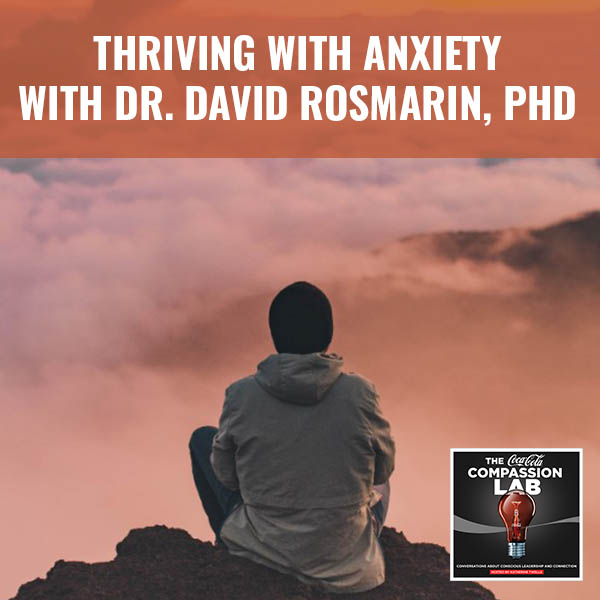
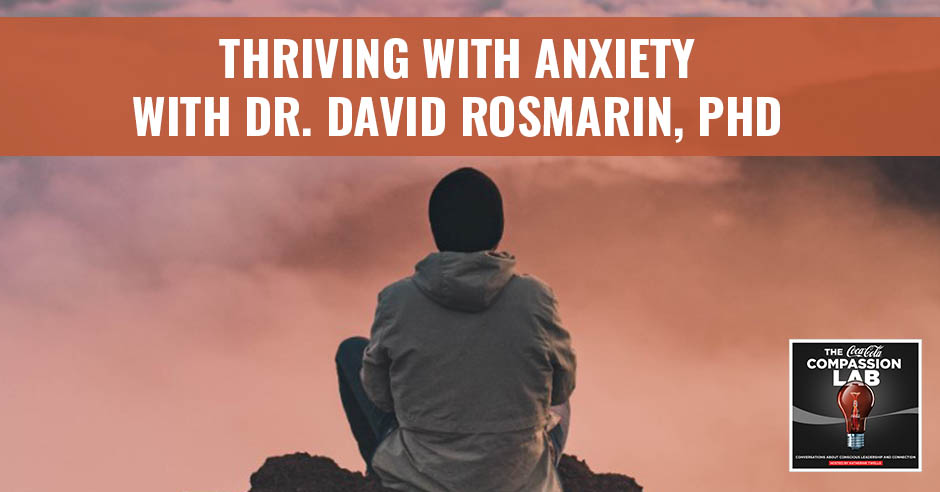
Anxiety isn’t always the enemy; it’s a guide, urging us to embrace discomfort and discover our greatest strengths within its grasp. In this episode, we have Dr. David Rosmarin—associate professor at Harvard Medical School, program director at McLean Hospital, and founder of Center for Anxiety—discuss how anxiety, often seen as a roadblock, can actually be a catalyst for personal growth and resilience. Throughout the episode, Dr. David discusses the various facets of anxiety and its intersection with personal and societal well-being. He shares intriguing statistics and eye-opening insights, revealing surprising connections between anxiety levels in different socio-economic environments. Dr. Rosmarin shares his vision for a world that embraces emotional struggles with compassion and understanding. Tune in now and discover how you can make anxiety work for you.
—
Listen to the podcast here
Thriving With Anxiety With Dr. David Rosmarin, PhD
How To Make Your Anxiety Work For You
I don’t know about you but I have had a lot of conversations about anxiety and it seems to be getting harder to navigate our daily lives with the intensity of our outer world. That’s why this guest is so timely because we are going to talk about how to use our anxiety. Not just about getting through it and surviving but how to thrive. Often, we want to push it away but what are some of the ways that we can change the way we think about it so it serves us to have a better life?
In this episode, my guest is Dr. David Rosmarin. David is the author of an amazing book called Thriving with Anxiety: 9 Tools to Make Your Anxiety Work for You. He’s an associate professor at Harvard Medical School, a Program Director at McLean Hospital, and the Founder of the Center for Anxiety, which provides services to over 1,000 patients a year in multiple states.
Dr. Rosmarin is an international expert on spirituality and mental health, whose work has been featured in Scientific American, The Boston Globe, The Wall Street Journal, and The New York Times. We dive into the concepts in his book and the incredible journey that David has been on. He is a wise and passionate resource for helping others understand their anxiety and use it to better their lives. I hope you will enjoy the conversation as much as I did. Let’s get to it.
—
David, thank you so much for taking the time to talk. I so enjoyed the initial conversation we had and I know that we have a lot to dig into so I wanted to say thank you upfront.
Thanks for having me. It’s great to continue our conversation.
David’s Origin Story
Let’s begin and ground our readers on you and your origin story. I will have shared your formal bio but what I want to know is a little bit more about you and how you got to be where you are doing the work you are doing in the world.
When I finished my fellowship at McLean Hospital in the Harvard Medical School, I knew exactly what I was doing when it came to anxiety, depression, and a whole bunch of other things. An opportunity came to start a clinic in New York City. It did involve splitting my time between Boston and New York, which was a challenge but some funding came in and it allowed me to be able to do that and have my platform or my foundation without a care in the world.
I stepped into this world of Manhattan commuting from New York because I wanted to keep my academic affiliation, which I had been offered. I wasn’t going to turn that one down at Harvard. Within a month of being in New York, despite having everything planned out and mapped out, I was full of anxiety and stress. Things were not going the way I expected.
I had one patient on my caseload. Nobody knew who I was. I was not a known entity. I knew that there was a need for anxiety services in New York. I intuited that one. I was wondering, “Here I am with a reasonable amount of credentials and a fair amount of training knowing exactly what I’m doing, and yet no one is coming into my office.” The worst day happened. I got off the train from Penn Station after a four-hour train ride because that’s the way trains are in America.
I’m thinking about how I complained about my commute here in Southern California. You were commuting for four hours.
It was horrendous. I get out of Penn Station. I’m walking down 6th Avenue to my office in the Flatiron District and my only patient for the entire day canceled.
You are like, “Is this what the universe is telling me to do?”
I wish I had gone there but I didn’t. I went into a very anxious place and then I started berating myself. “Here you are an anxiety expert getting all anxious. You’re supposed to be knowing what you are doing and you have got to eat your words. You are a fraud. You are this.” I stopped myself cold and said, “No. We are not going to do this.”
“The reason why you are panicking is because you are trying to pursue a dream. You are out there on a limb. The wind is blowing and it’s scary. This is normal. You are not going to judge yourself. You are not going to catastrophize. We are going to go to our office and have lunch. We are going to chill and do the best that we can. At the end of the day, this is either going to work or not and it will be a lived experience.” At that moment, I caught myself and said, “You can use anxiety to thrive in a positive way if you have the right tools.”
The reason why you're panicking is that you're trying to pursue a dream, and you're out there on a limb and the wind is blowing, and it's scary. This is normal. Share on XWhat was crazy is that none of my clinical colleagues had ever framed it that way before, that it can be something to catapult you into a positive state. Usually, it’s getting rid of our anxiety. We want to medicate or therapy it away. We want to meditate it away or do mantras, whatever it is. When it came to this, I was like, “I am glad that I had this experience because this is the message that I want to share with people.”
I have been on that quest ever since in my office, Center for Anxiety. You are not going to believe this. I can’t even believe it. We have got 7 offices and we see 1,000 patients a year. Had I not embraced my anxiety that day, even had it been successful, we wouldn’t be able to send this message that you can have a better life with anxiety if you use the right tools than if you don’t have anxiety at all.
I love your message because I agree. It’s so much about what we need to change. Yes, we do need to change and evolve but it’s like, “Get rid of it.” When you pan out and think about it, every way we grow in our life includes some pressure and push. If we didn’t have that, we wouldn’t grow. We’d be staying in this stable state. It is counter to what you hear but it makes so much sense.
The world works that way. If you want seeds to take root, you have to plow the earth first and break it apart. Things have to be broken and somewhat shattered. Our landscape is the same. When we are struggling, sometimes there’s something that can come up from that challenge or broken earth that flowers forth. It’s an amazing thing but you have to let it happen and we don’t.
After a few minutes, we start to feel anxious and we are like, “I can’t feel this way. I got to do my work. I got to take on more and do something. I have to make sure that I can’t feel this way and it’s not true.” The more we embrace our anxiety, the more we allow ourselves to feel overpowered at times, vulnerable, and acknowledge our limitations. That often if not always is where the magic happens.
The more we embrace our anxiety, the more we allow ourselves to feel overpowered, vulnerable, and acknowledge our limitations. Sometimes, if not always, that is where the magic happens. Share on XCatching That Negative Self-Talk
I remember when I first started doing more spiritual practices and meditation and trying to embrace equanimity. Something comes like a little bit of a Zen. If something comes, it comes. If something goes, it goes. It’s all good and then something would happen. I’d get triggered and super upset or freak out. I’d be like, “I’m not doing my work.”
There’s that self-talk that you talked about when you were in that moment of starting the Center for Anxiety of how you caught yourself going down this road of negativity, which is what we so often do. That inner critic and Imposter syndrome come up like, “I can’t. What am I doing?” It’s negative. We all know that voice. When that starts, how do you catch that? Often, we lose ourselves in it. How did you stop yourself at that moment?
The first point to catching it is to reframe anxiety from being a disease or always a disorder to a normal part of the human emotional landscape. To me, the biggest reason why we cascade from small or medium levels of stress and anxiety into the abyss of distress is why we get all negative about it. We are primed in our society to think about anxiety as a disease or a disorder that anytime I feel anxious, stressed, or upset, that’s not normal. I’m not supposed to feel this way.
As a result, the minute I start to feel upset, my body will dump more adrenaline into my system because I’m perceiving the distress as a problem. I become upset about the fact that I’m upset. That cascade happens on an hourly basis across our society and has created the anxiety epidemic. That’s at the core of the epidemic. We are trying to control our feelings. We are trying to always be in the know, in control, and have good feelings, vibes, and equanimity, to use your word. It’s not realistic. Sometimes you are going to lose your stuff.
Isn’t that part of the beauty of the human experience? We get to experience all of it. There’s pain, joy, love, and grief but that’s the juice of our life. It’s not always bad because the contrast of that grief is how we can feel so much joy. Would you agree with that?
I would agree with it. At the same time, the grief and the pain sucks. It’s so bad. We can’t sugarcoat it and pretend. I don’t know about you. I have certainly had a couple of panic attacks in my lifetime. 90% of Americans have had at least 1 panic attack. I have had 2 or 1.5. It’s a horrendous experience. I did learn a lot about myself when I panicked, most of all what my patients go through. If I hadn’t had an experience of anxiety, how could I treat anyone? It’s given me a much kind or thoughtful I’d like to think so.
My clinical practice is usually taken up by corporate types CEO folks and their families. A lot of C-Suite folks come to me. It’s amazing. Often, they come in like, “No, I’m fine.” We scrape the surface a little and then they are like, “I can trust this guy. He’s not going to judge me.” They are like, “I’m not fine. I’m struggling.” Acknowledging that is usually the first and most critical step to becoming a better spouse, parent, and manager because they have a better sense of what other people are going through by leaning into their distress and struggles.
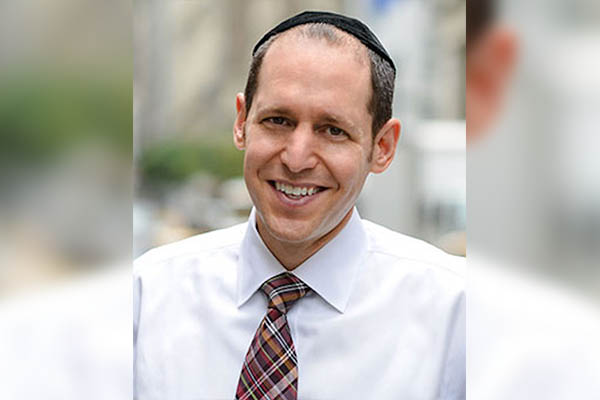
Thriving With Anxiety: Acknowledging is the first and most critical step to becoming a better spouse, parent, and manager. Because they have a better sense of what other people are going through by leaning into their own distress and struggles.
What you are saying is important. Part of the mission of the Compassion Lab is to put us on the road to a higher level of consciousness. In the business world, there are many who say an organization can only go as far as the consciousness of the leader. At the C-Suite level, at leadership across all levels, if we do not do this work to acknowledge our vulnerabilities, suffering, and pain, then we are not leading in the highest way because we have our mask on and we expect that we need to be in control all the time. While we should, in general, try to keep it together in the business space, we have to acknowledge that there’s hard stuff that we have to live through and face.
That doesn’t have to be part of the public persona. Not every CEO, VP, or high-level exec is going to feel comfortable speaking about this in public. It doesn’t have to be on your Twitter feed, X feed, or whatever we call it. It doesn’t have to be part of your public persona but you need to have at least 1 or 2 people who shoulder you can cry on.
Years ago, I gave a talk at Harvard College. The head of the Harvard Counseling Center at the time was there. He gave a statistic I will never forget. It was incredible to me. This is very systematic research that was done in collaboration with the Department of Psychology and a whole bunch of other departments on campus. He said, “The best predictor of the functioning of Harvard students, the elite of the elite, was do you have at least one friend who you can open up to in a real way about emotional issues that are on your mind?”
That was the number one issue. Not their SAT or ACT scores. It wasn’t which major they were taking. It wasn’t which dorm they were in or socioeconomic status. The best predictor of wellness was, “Do you have a shoulder to cry on and can you do that?” Be vulnerable with 1 or 2. It doesn’t have to be everyone, whether it’s a spouse, sibling, close friend, or therapist for that matter. We all need to have a moment where we can lose it in the presence of another and not feel rejected for the real issues that we are all facing at some level.
Changes In Anxiety Over Time
Initially, I was surprised when you said that but there was a Gallup survey years ago when they started digging into engagement at work. One of the number one things is, “Do I have a friend at work?” Having these safe places to go is so important especially as the world is changing. I want to talk about the world but before we get into some of the bigger dynamics that we all have to balance, what have you seen in changes in anxiety over time? You have been in this work for many years. Especially with COVID, what are the anxiety levels you’re seeing?
During 2010, we saw between 50% and 70% increase, which is incredible, and then COVID happened, which took things up another between 25% and 50% depending on your age. For young adults, it’s 50% higher. It’s not a matter of numbers and people recognizing it more. There are objective behavioral measures that mental health in our culture is going off a cliff. It is already tumbling down a cliff frankly. The suicide rate is through the roof. It’s the number 2 cause of death among individuals 35 and younger, including ages 10 to 14. It’s incredible.
The number of people who harm themselves, non-suicidal self-injury, you are not going to believe this but some very high-level stats that I saw suggested that 1/5 of teenagers are harming themselves. It’s one of the top reasons why young individuals present to ERs when it comes to self-injury. The levels of disability, people who go on disability, which costs billions of hundreds are incredible sums of money to the economy because of depression and anxiety. Mental health is the number one reason. That was never the case during the 20th century. For sure, things are getting worse.
I sat through a presentation years ago where someone talked about how our quality of life is so much better like medical care and longevity. All these things are better but yet our mental health is not better. When you say that having teenagers, it’s so scary. We have seen people at work who have lost young people to this.
One of the reasons the Compassion Lab was born out of the pandemic as many new work streams around embracing the whole human is because of the awareness that people are walking this thin line every single day. Think about it in the workspace. You mentioned safe places but you show up every day and everyone is like, “I’m fine. I’m great.” Everyone’s got their game face on. I always wonder what’s going on behind for that person.
We are so technologically and economically advanced yet we are having a mental health crisis. It’s because of this. If you look at middle-income countries, they have half the level of anxiety that we do. If you look at low-income countries, they have half the level of anxiety of middle-income countries. The explanation for all of these phenomena is we have become accustomed to everything going our way.
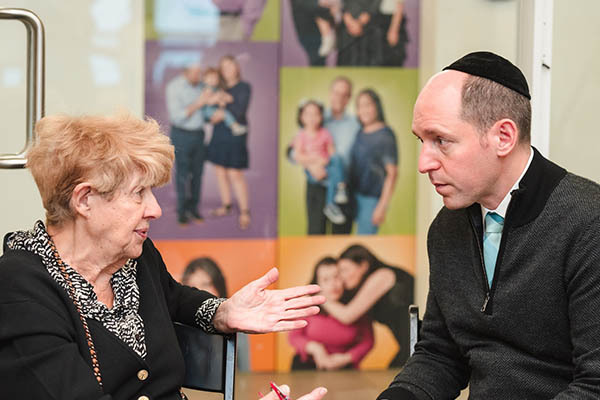
Thriving With Anxiety: We are so technologically advanced and economically advanced, yet we’re having a mental health crisis.
We assume that you can snap your fingers, everything works, and there shouldn’t be any difficulties. Young people especially expected to have one million Instagram followers and have a company that is pumping out hundreds of thousands of dollars a month before they even finish high school or college. They’re like, “Other people have done it too so why can’t I do the same?” Those expectations are not realistic. People go through difficulties.
In years past during the 20th century with two world wars, Korea and Vietnam, people didn’t expect to have everything handed to them on a silver platter. They didn’t expect things to be great. It’s understandable. If you are having a struggle, there’s nothing wrong with you. It’s called life. That’s called Tuesday morning but now, it’s like, “Why aren’t my emotions perfect? Why aren’t things going so well for me? Why am I a failure if I can’t get 100 on my tests?” We have created this culture of needing to have everything right away, the Amazon culture.
Social media has been also talked about a lot. There are some lovely things about social media. You keep up with old friends and maybe subscribe to some positive messaging. That can be very good but we all know. We see perfect lives but none of it is real. You start to compare your inner life with someone else’s outer mask and it’s so unhealthy.
It’s well put. Parenting and educational institutions have a lot of work to do and can do a lot of things to help stave off or reverse some of the effects of the anxiety epidemic. One of them not rescuing your kids when they are struggling.
It’s so hard.
I know. I’m a parent of six. Each one of them has their struggles at any point in time. It’s even harder than having myself or my wife struggle watching them and not coming in and rescuing them. It used to be helicopter parenting where you are hovering over and trying to see and get the play-by-play. Now, it’s lawnmower parenting where you get in front and you plow the way and the kid follows behind. Kids are not becoming resilient. They think that everything should be fine. The minute things go down and start to struggle, they plummet.
It is such a balance. You are speaking to my soul here because I’m always balancing as a parent. We are in the college application process. It’s like, “Have you done your essay? Have you done this?” I’m trying to be a coach but it’s knowing that they have to do it and decide. You talk to friends who are like, “I have hired a coach and they have done this. They are walking them through the process.” I’m like, “Maybe I should have done the coach.” It is a crazy thing sometimes.
It’s important to support children in ways that you can while giving them permission to accept or decline that support. That’s the art and balances. “These are the options that are in front of you. I hope you choose well.” Whatever you choose will be what it is. Letting go is so hard. They have the free will. It’s beyond our scope and it hurts but it’s true and so important for them. I gave a talk at the high school where I graduated from. I was not the best student. The vice principal was there. I used to have a permanent seat in his office.
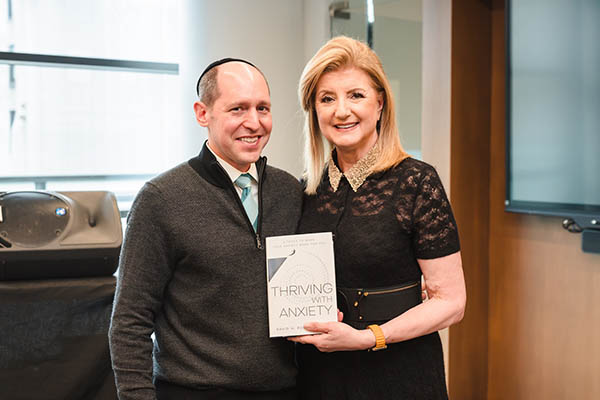
Thriving With Anxiety: It’s important to support children in ways that you can while giving them permission to accept or decline that support.
I didn’t know you had this misbehaving side.
He said it well at the end. He said, “You always used to push the boundaries and you are doing that in mental health too so I’m proud of you.” The reason I wanted to tell you the story was because one of the students came over to me after my talk about my book. She said, “We have a lot of mental health work here and that was the best talk that I have read.” I said, “Thanks very much. Why? What about it that was so helpful?”
She said, “You are the first speaker I have ever heard who believes in me that I can handle the anxiety. Everyone else is telling me how I have to get it away and reduce it. I can’t embrace it. This is the first time that I have ever felt empowered that even though it’s distressing, I can overcome it. Everyone else reduced my triggers, which has made me more freaked out that I can’t handle it. Now, I believe in myself.” I was almost crying. That student got it.
It’s powerful, David. It’s giving us permission to be fully human and not push away the parts of ourselves that are here to maybe be a teacher and show us something we need to see.
Thank you, especially since people are often more economically supported. Benefits are usually better. Salaries are better at least than they were. There’s a lot more economic certainty, not for everyone. There are disparities and I don’t mean to minimize that. Within the corporate culture, there are a lot of blessings that people never had. It’s very important for our kids, for the next generation, to in some ways earn some stripes, go through difficulties, and not be overly sensitized to the troubles and trials and tribulations that life naturally brings.
Navigating Through The Sufferings In The World
Let’s stay on this thread of trials and tribulations because we were chatting a bit about the world. There are some pretty challenging things happening in our world. There is war. You have already talked about the levels of anxiety and mental health but it’s almost like it’s stacked trauma. We had COVID. It’s been issues with tribalism of people against each other in many domains. You have it manifesting into war and violence. How do you hold it in your regular every day when you know they are suffering in the world?
Here’s one fascinating statistic that I have seen and I mentioned this before in terms of socioeconomic status, the lower and middle-income countries. In countries where people live with security threats, their levels of anxiety tend to be less than we have in the United States, which is fascinating. One of the reasons why is because there’s a resilience that happens.
In war, terrorism, and humanitarian crises, whatever is going on, the acute phases are 30, 60, or 90 days after. That’s a different situation and that requires a different discussion. The medium and longer-term effects of that when people live with the looming and constant threat are not necessarily so bad. People have asked me, “What’s going to be with the mental health in certain countries or areas?” I’m much more concerned about Americans.
We are not equipped.
No. We are super weak and not able to handle stress, struggle, and putting our lives on the line. What do American kids think is worth dying for? Nothing.
I can’t even think of how to answer that question.
There’s no answer. That wasn’t the case in the 1940s, 1950s, and even 1960s to some degree. Do we have something more valuable and important to us than our happiness? When people have ideals and whether they believe in those ideals or not, living in the midst of tragedy and war is not necessarily as detrimental if one has a certain framework that they have a reason why they are doing what they are doing.
Don’t you feel like when you live in that type of space where it’s that level of threat or even if you think about your life where someone in your circle has an illness, all of a sudden, your priorities realign to what matters to your relationships, to love and care for others, and look outward in service. You are not worried about your Instagram followers or if you have the latest pair of Nike shoes. You are worried about the things that matter to the soul or spirit. What you are saying is we are not in a space of having that level at least of the macro. People reading this would say, “I have suffered plenty.” It’s not that people are going through things but it’s societal and cultural.
You are thriving with whatever anxiety you have had in your life. You have taken the opportunity of whatever distress you have experienced. You have seen others’ experiences and parlayed that into spiritual growth, connection with others, and reorienting yourself through your values. Maybe recalibrating, rebalancing, and being more compassionate towards yourself. I imagine all these things.
Many people don’t do that. A lot of people don’t lean into their distress. They allow it to break the ground and take those positive directions. Most of the time when we feel distressed, we are like, “I must feel good now. I have to stop this immediately, get back to work, and simply push on.” We ignore it. That’s where we lose out on the opportunity that anxiety presents to thrive and move forward in our lives.
A lot of people don't lean into their distress. Allow it to break the ground and then take those positive directions. Share on XWe live in a world of distraction. It’s anything we can do to not feel what we feel, even moments of silence and stillness when I talk to people. Not that everyone has to meditate. There are many ways like taking a hike in nature and doing whatever you need to do. There’s no one way but when I do talk to people about getting still and silent, some people are so uncomfortable like, “I can’t sit there because I don’t want to confront what’s coming into my mind. It’s hard to look at. I’d rather turn on the TV, get on my phone, go drink, or party and not think.” You have to be a warrior to look at this sometimes.
It is scary. The hardest battle that we face is facing our demons. The distractions don’t do us any good. That’s the main reason I would say that we are moved into such a distressed state. We are not dealing with what we have to deal with and not doing what we have to do.
Thriving With Anxiety
I mentioned warrior so it triggered. I have your beautiful book here. For everyone reading, it’s called Thriving with Anxiety. As David has been talking about, it’s the gifts of anxiety and how they can serve us. One of the things that you talk about in the book is this level of control. As we talk about the world, we talk about war and the economy. We are all very concerned about the economy. Much of this is control.
You have this quote from your book, “A warrior accepts that we can never know what will happen to us next. We can try to control the uncontrollable by looking for security and predictability, always hoping to be comfortable and safe. The truth is we can never avoid being out of control. This is part of the adventure but it’s also what makes us afraid.” You talk a lot in your book about this idea of control and that’s where the distraction comes.
When I get stressed, I clean out my closets and reorganize everything. It’s weird like, “I can do this. I can clean this.” I can feel in the moment that I’m somehow controlling my world all well knowing in my higher wisdom that I’m not controlling anything at all. We already talked about surrendering with your children and all that. How does this idea of having control enter into our spaces as humans and in the workplace?
One of the questions I like to ask people is, “If you didn’t feel anxious, what would you be doing? What do you want to do in your life? Where do you envision yourself years from now? What’s your goal? What’s your dream?”
“I want to feel endless bliss.”
Maybe. That’s a very American answer. Most people, if you push them on, they are going to say, “This is what I’d like to achieve. This is who I am deep down. If I were going to actualize this aspect of myself, this is the way I see the world changing because of my potential contribution but I’m afraid to go back to school, have that conversation with my superior, or take on this extra product. What if I fail? I’m afraid to take the next step in my relationship. Who knows? I might get hurt. I’m afraid to have that conversation with my kid because I don’t know what it is.”
Whatever these steps are and however we want to see our lives, there’s a reason that’s holding us back, which is often anxiety. If you are feeling anxious about something, that’s probably a sign that you should be doing it, not a sign that you shouldn’t, or at least give it some significant thought like, “Why aren’t I doing this? It would be scary but it’s what I want.” If you are pursuing your dreams and feeling anxious and uncomfortable, that’s great. You are on the right path.
As much as I laugh as I say endless bliss, it sounds great on the surface but for the same reason, I don’t want to be on vacation 24/7. I saw some quote on social media that was like, “You spend X amount of days toiling for seven days of vacation.” The whole idea of what was written was like, “You are a slave to your work,” and all this stuff. I was like, “No.”
If you are doing your mission in the world, it is super fulfilling, even the hard stuff. I even remember something so many years ago, early on with the company. I grew up in Florida in the South and I got assigned a territory in Downtown San Francisco. I remember first-time driving into the city, seeing San Francisco before me, and being like, “I grew up in a small beach town with strip centers. I have no idea how to navigate this place.”
A year into that, I look back and it was so fantastic how I learned how to navigate and connect into that ecosystem that was this major city. There are many other examples of times when I have been pushed into something that has scared me and, in the end, had been like, “That was exhilarating.” It is the way it works. It’s how we evolve. We don’t want to just hang out.
When was the last time you had an exhilarating experience that didn’t involve facing some anxiety along the way?
I can’t even think of one. This was also brought up for me when I was trying to decide whether I wanted to have children. I was wondering, “Am I going to do this? Am I not going to do this?” I’m talking to people and I was at a party. At that party, someone said something I will never forget. They said, “Having kids is like going to the theme park. You can go and not ride the rollercoaster and have a great day. You can have a great day. You can get on the rollercoaster and be scared to death and scream. It’s exhilarating.” They were drawing the analogy of having children as like getting on the rollercoaster. It resonated with me because it’s a scary thing but also exhilarating.
Parts of the rollercoaster are terrifying and not fun. You are bored waiting in line. It’s hot and sticky. You then get on and click. You feel your stomach. You are right. Even the same brain structures that are implicated with anxiety are also implicated with exhilaration so much so that you can prime yourself for happy, positive, and exciting experiences by allowing yourself to feel that distress. It’s almost like mental gymnastics.
You said this but it is true. The anxiety and excitement are the same physiological expression.
You have tachycardia, an increased heart rate, breathing, and sweating. There’s dilation of the pupils. There’s even the secretion of adrenaline and the physiological processes that create all those physical changes. Those are very similar when it comes to anxiety. It has similar brain structures. The amygdala, which is a structure in the midbrain, is associated with high levels of excitement and fear. It’s pretty cool how these things are linked.
I tried to flip the script on that with my boys one day. They were nervous about something. I was like, “It’s the same feeling in your body. It’s excitement. Imagine you are excited.” I got the eye roll. It didn’t work on them. I also remember being in a meeting and a talk. Brené Brown was speaking. She came out on the stage and said, “People asked me if, after all these talks, I still get nervous. I get so nervous backstage coming out. For me, it would be irresponsible to not be nervous because to be nervous means I want to bring my absolute best to you.” That stuck with me too. It’s okay.
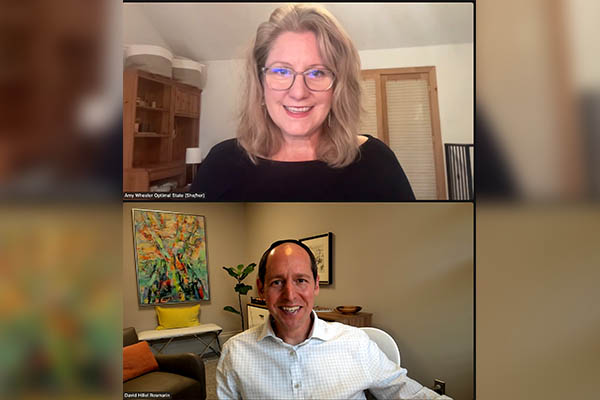
Thriving With Anxiety: To be nervous means wanting to bring your absolute best.
I have an example in my book about one of the goaltenders for the Chicago Blackhawks who used to vomit in the locker room before every game. This was before they were wearing face masks and he was a goaltender so I don’t blame him. He gave the same answer as Brené Brown. “This means my heart is in it and I’m here.”
I love that we are reframing what the gifts are. There are other things from your book that I have written down here. You mentioned how anxiety helps us connect. You have something in there called Myth of Compassion Collapse. We are talking a lot about the world and what’s happening in the world. How do our trials and anxiety help us be of greater service to others?
I mentioned it beforehand with regard to CEO types who often come in and are jaded. “Why do I have to be here?” They got their car waiting for them downstairs outside my office. It’s comical. The first couple of sessions, even a couple of months, they are like, “I’m here because of my spouse and my kid. I don’t have any problems.” When they start to go down the elevator and speak about what’s on their minds and hearts, they become so much more aware of the struggles that their kids are going through. Often, the kids of C-Suite execs are struggling so much because they compare themselves to their parents’ success.
That’s disparity. It’s so easy to be a F-up. The kids who struggle the most I have seen in my office, and we see over 1,000 patients a year, are the best looking, brightest, and from the wealthiest and most prominent families. No question. Those are the hardest cases to deal with. The reason is that often their parents don’t see the fact that they are struggling because they are caught up in their world.
It’s once they can understand their anxiety and pain. Often that pain has been drowned out and they have been on a career and working super hard. Sometimes that’s been a cause for success but it’s still an opportunity and an urgency to slow down, recognize what’s going on, and then be able to understand the struggles of the people around you. Compassion comes from accepting and experiencing distress. That’s what makes us more sensitive to the pain of others.
Would you say that it’s a combination of looking in and out? We already talked about distraction. There’s that part of us that has to look at what we need and what’s going on with ourselves where we are wounded, where we are afraid, and how we need to see it, experience it, accept it, and even transcend it at some point. At the other point, there’s the lookout. There’s how we look at others and see them in a new light as well. Is it dancing back and forth between those two things?
That was brilliantly put. I like how you said that. If we understand our struggles and take the time to do so, as opposed to staying on the train track and moving forward, we are much better able to see the pain of others. The more we can see the pain of others and be compassionate to it, the better we are able to understand ourselves and accept ourselves.
The more we can see the pain of others and be compassionate to it, the better we're able to understand and accept ourselves. Share on XUltimately, we all need this connection. It doesn’t have to be all the time. I’m not saying that all corporate folks have to do this 24/7 but at least on a daily basis to be able to check in with themselves and check in with one’s loved ones and have moments of compassion, self-awareness, and be real, vulnerable, and emotional that punctuate each day. It’s a very healthy practice and one that we have gotten away from unfortunately to our detriment.
One of my dreams is to see all of our lives but our workplaces in the future being whole human and a flourishing human environment. There’s an art to this because it’s not having the CEO in the middle of an important speech on earnings to break down in tears. It’s not the time and place.
Not during the meeting of the board of directors but it could be during a company address to say, “I have been having a hard time too.” There could be a one-off line. That’s appropriate to say. I have seen several corporate folks who do take that step. I don’t think it has to be. Some people are naturally more private and that’s fine but we need somebody who we can cry on their shoulder and someone who we can be real with. If we don’t think we need that, that’s where I get concerned.
Power In Community
One of the things we are seeking to do in the lab is to create community. When we come together in our sessions internally, it is to have conversations about maybe being overwhelmed or what we have been talking about on holding the tension of the world where we don’t have these magical answers. There’s no magic wand or silver bullet. It’s recognizing that we are all standing in this place of, “What do I do about that? How can I manage it better? How can we support each other?” That connection and community going back to the idea of the Harvard students and having that one person that they can cry to or reveal their full selves to, the more we can show up in our full selves with situational appropriate dynamics there. There’s such power in that community and possibility for us.
Another idea that’s coming to my mind interpersonally is that often when you show vulnerability and say, “I’m having a bit of a hard time right now,” people will often back off. As opposed to if someone comes to you with a request and you can’t manage it, it’s like, “That’s an important request but I will be honest with you. Right now, I’m having a bit of a hard time. Please, can you give me a week? That’s what I need to be able to manage it.”
That’s acknowledging vulnerability. It’s not saying no. It’s like yes and. It gives the person a little bit of your emotional landscape and shares with them where you are holding. That’s a great way of communicating, which shows a little bit of what we are going through without showing too much. It also validates. “I get that you have your needs. I have my needs too. Let’s try to negotiate and get these both met.” You have to be able to lean into the pain to go there.
This is the journey we are all on. How do we face our pain? How do we hold the world’s pain knowing that we are all connected? I’m looking at our time and I have about ten other areas to cover with you. I’m like, “Can we do a part two because there’s a lot more to talk about?” As you think about people reading our conversation, and if I go pan out full circle to what you talk about and the fact there are gifts from our anxiety, for those people reading this conversation, what would be some of the big things you would want to share with them about your work and some of the small steps they can take as they are managing their daily lives and using anxiety to help them?
I will summarize it for you in a couple of sentences. 1) You will feel anxious and distressed at times. Why? It’s because you are human. If you are reading this show, you are a human being and you will feel distressed and anxious. That’s point number one. 2) When that happens, lean into it. Don’t try to shut it off or squelch it. Allow yourself to feel it. Don’t judge yourself for it. Don’t shut off the faucet like I mentioned. Lean into the feelings. Let yourself be distressed.
You will feel anxious and distressed at times. Why? Because you're human. Share on X3) Find positive outlets to be able to take that distress and channel it toward thriving, whether that’s speaking with somebody else about what’s going on for you and being vulnerable with them, increasing your emotional intimacy and connection with people who are in your closer circles, or allowing yourself to recalibrate and rebalance.
You say, “I’m having a stressful week. I have to take things down a little bit of a notch here,” or whether it’s pursuing your dreams, moving beyond your anxiety, and building resilience. Whatever it is, our anxiety can be parlayed. I have nine tips in my book. I gave you four of them off the cuff. There are lots of different ways to use our anxiety but it all starts with acknowledging, accepting, and then eventually transcending and moving into the space where we all want to be.
It’s well-summarized. Go get David’s book. It’s an amazing manual to think about this a little bit differently and look at how it can serve us to be better humans and better to others in our lives. Thank you for the work that you do and for having the courage to start the Center for Anxiety and look at all the people that it’s serving in the world. That is so super cool. I want to honor you for that work. Can I close with a couple of rapid-fire, whatever comes to your mind a couple of questions at the end here?
Anything.
What is your superpower?
My wife.
What brings you the greatest piece?
I was going to say embracing the fact that when I don’t have it but that would be redundant to our whole conversation. I’m going to say that when I believe that I’m pursuing what I should be pursuing. When I think that I’m on the path of my values and I’m actualizing my potential even if it’s not comfortable and anxiety-provoking, if I feel like I’m on that trajectory, that’s ultimately what brings me the most peace even though it’s not necessarily the most comfortable.
You probably can use that answer for the next question but anything else you would add. What does living a good life mean to you?
Even if it’s uncomfortable or not fun all the time or convenient, even if it’s not comfortable, I used that word again but I will say it one more time, living a valued life, doing what you are born to do. Get on the limb and do it.
Go make it happen. You do you. What’s your hope for the world?
I hope we are getting to a tipping point with our mental health and recognizing that the new approach of trying to snuff out any aspect of emotional distress has made us much more distressed. We are getting to a place of more acceptance that we are human. We can only do so much. We are going to struggle and that’s part of the journey.
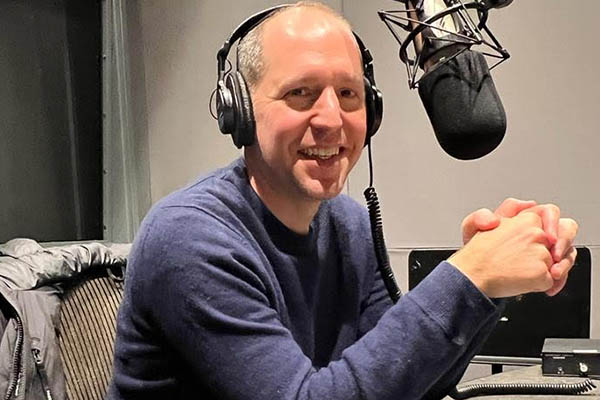
Thriving With Anxiety: We are just human. You can only do so much. We are going to struggle and that’s just part of the journey.
David, I want to thank you for everything you shared in our conversation. I have enjoyed it so much. Are there any final thoughts as we close out or final words for our readers?
It’s so cool that Coca-Cola has this show. What an awesome company that you all belong to. More corporations should follow suit. To be a part of it is a real gift. Thank you.
Thank you. I appreciate that so much. I work for an organization of wonderful, caring, and inventive people. It’s pretty cool. Thank you so much.
Thank you.
Important Links
- Thriving with Anxiety: 9 Tools to Make Your Anxiety Work for You
- Center for Anxiety
- https://DHRosmarin.com
About Dr. David Rosmarin
 David H. Rosmarin PhD is an associate professor at Harvard Medical School, a program director at McLean Hospital, and founder of Center for Anxiety, which services over 1,000 patients/year in multiple states. He is an international expert on spirituality and mental health, whose work has been featured in Scientific American, the Boston Globe, the Wall Street Journal, and the New York Times.
David H. Rosmarin PhD is an associate professor at Harvard Medical School, a program director at McLean Hospital, and founder of Center for Anxiety, which services over 1,000 patients/year in multiple states. He is an international expert on spirituality and mental health, whose work has been featured in Scientific American, the Boston Globe, the Wall Street Journal, and the New York Times.
Through his work as a clinical psychologist, scientist, educator and author, Dr. Rosmarin has helped thousands of patients and organizations to live happier and more productive lives. His most recent book is Thriving with Anxiety: 9 Tools to Make Your Anxiety Work for You.
Love the show? Subscribe, rate, review, and share!
Join The Coca-Cola CMO Leadership Summit Podcast community today:
anxiety, distress, empowered, mental health crisis, spiritual growth connection, Vulnerable
